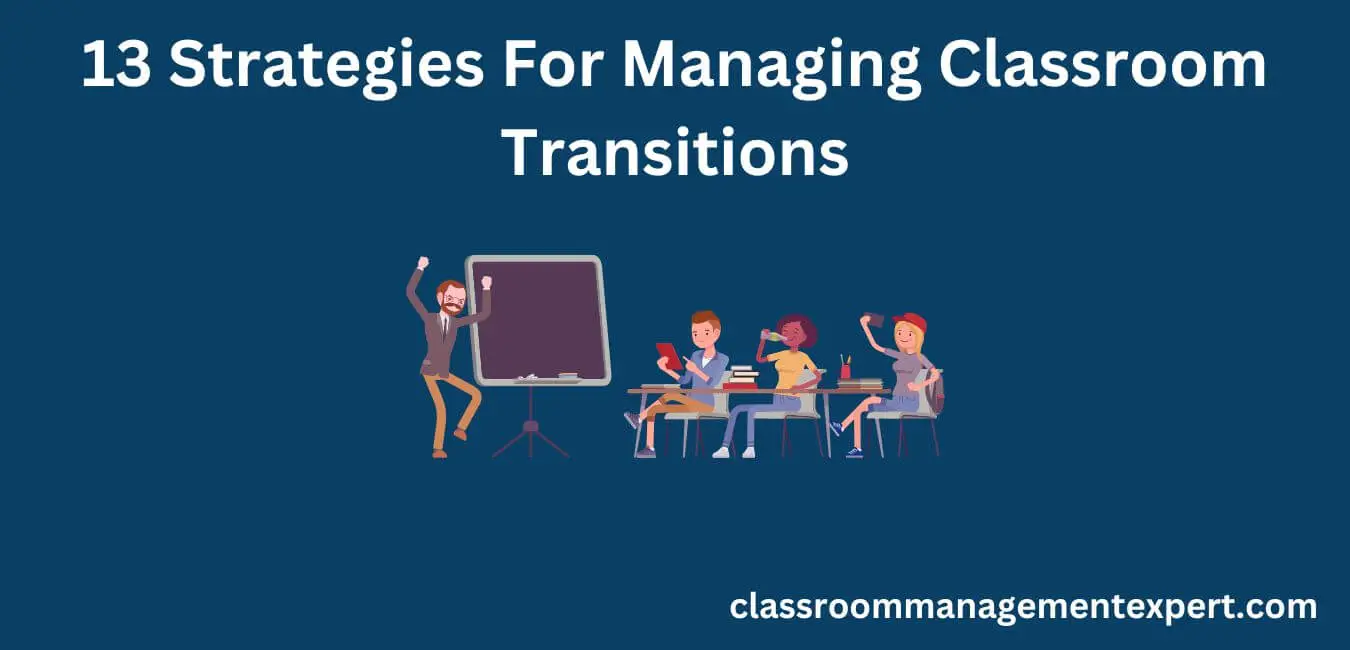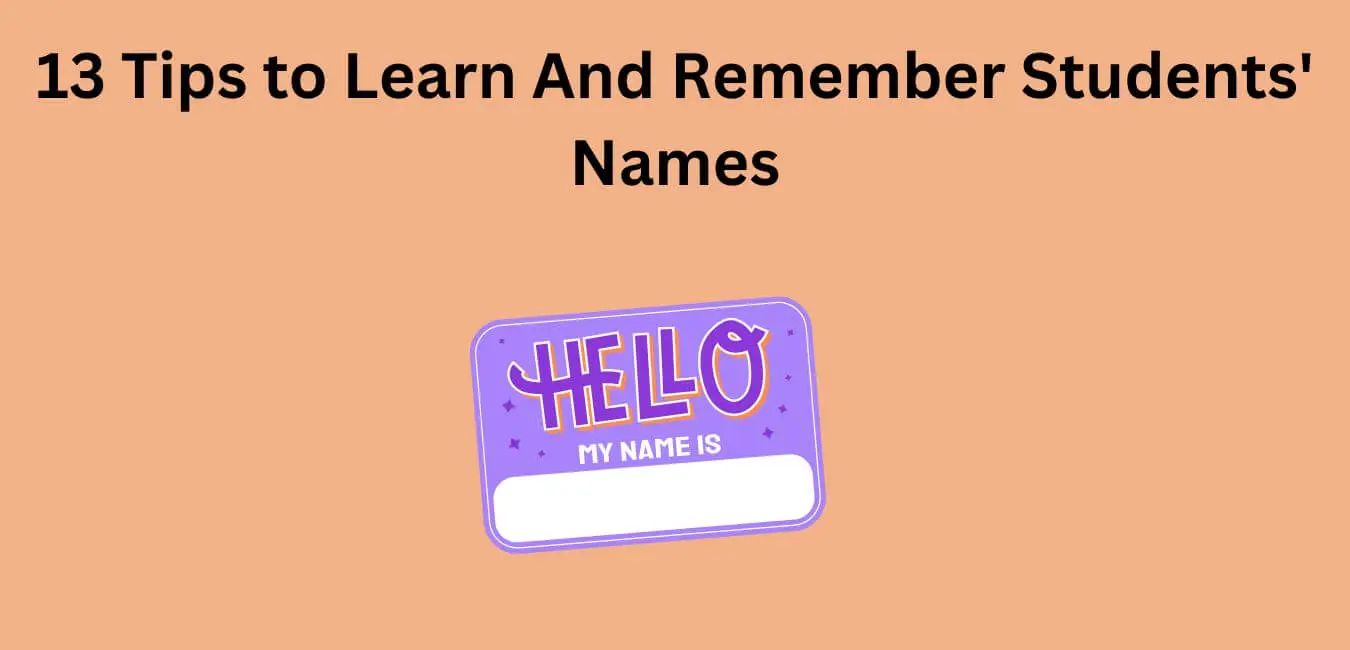Respect is an important part of any relationship between students and educators. It can be difficult to earn the respect of your students, but there are ways to do so.
You can start by setting an example for them and demonstrating good behavior yourself. You can also try to provide valuable information and support for their academic endeavors. Lastly, make sure to listen to what they have to say and show that you value their input.
In this article, I explored 25 ways to earn the respect of your students. Let’s jump into it!
Ways to Earn the Respect of Your Students
1. Be genuine and sincere when interacting with your students.
As a teacher, it is important to remember that your students are looking to you for guidance and support. In order to earn their respect, it is crucial that you be genuine and sincere when interacting with them. This will help create a positive and supportive learning environment in which your students can thrive.
2. Show them you care about their well-being.
One way to gain the respect of your students is to show them that you care about their well-being. This can be done in a variety of ways, including connecting with them on a personal level (e.g., by sharing personal stories and experiences), providing feedback on their work, and asking them how they’re doing.
3. Demonstrate consistency in your approach to teaching and disciplining.
One of the best ways to earn your students’ respect is to demonstrate consistency in your approach to teaching and disciplining. When you are consistent, your students know what to expect from you and they can plan accordingly. This predictability helps to create a sense of order in the classroom and ensures that all students are treated fairly.
Additionally, when you are consistent, it sends a message that you value discipline and that you take your job seriously. This can help to motivate your students and encourage them to behave appropriately. Consistency also helps students to understand that you do not make exceptions for anyone.
Thus, when you are consistent, your students can trust that you will discipline them impartially and fairly. Consistency can be difficult to achieve when it comes to disciplining your students.
4. Be patient and understanding when dealing with challenging behavior.
One of the most important things a teacher can do in the classroom is to remain patient and understanding when dealing with challenging behavior. When students feel that their teachers are not getting angry or frustrated with them, they are more likely to respect them and behave in a more appropriate manner.
There are many reasons why students may act out in class, and it is important to try to understand what may be causing the behavior before reacting. Some common causes of challenging behavior include frustration over not being able to understand something, anger over a situation of injustice, feeling neglected or misunderstood, or trying to get attention.
By taking the time to understand what may be motivating a student’s disruptive behavior, teachers can develop strategies to help that student resolve the underlying issue. In many cases, this will lead to a decrease in challenging behavior and an increase in academic success.
5. Establish rules and expectations.
As a new teacher, you are probably eager to establish a good relationship with your students. The best way to do this is by establishing clear rules and expectations. By doing this, you will be able to earn the respect of your students. Here are some reasons why you should establish rules and expectations:
a. It sets the tone for the classroom and shows students that you are serious about academics.
b. It makes it easier for you to manage the classroom and enforce rules.
c. It helps create a structured learning environment that is conducive to learning.
d. It teaches students how to behave in a classroom setting.
e. It builds trust between you and your students.
6. Show respect to your students.
As a teacher, it is important to show respect to your students in order to earn their respect. When you show respect, you are setting the tone for the class and creating a positive learning environment. You are also modeling the behavior that you expect from your students.
There are many reasons why it is important to show respect to your students. First of all, when you treat your students with respect, they are more likely to behave respectfully towards you and others in the classroom. Secondly, when you show respect to your students, they feel valued and appreciated. This can motivate them to work harder and learn more.
Finally, when you are respectful towards your students, it builds trust between you and them. This trust can be beneficial in terms of establishing open communication and fostering a positive relationship.
7. Respect your students’ privacy.
If you want your students to respect you, you need to respect their privacy. Students need a place where they can feel safe and comfortable, and sharing their personal information with you compromises that. You may be tempted to ask for personal information in order to get to know your students better, but there are other ways to do that without violating their trust.
Respecting your students’ privacy is important because it helps them feel safe and comfortable in your class. When students feel like they can’t trust you, they won’t open up and share with you. This makes it difficult for you to help them learn and grow. By respecting your students’ privacy, you earn their respect and create a more positive class environment.
8. Respect their intelligence.
As a teacher, it is important to remember that your students are intelligent individuals. They come to class with a variety of life experiences and knowledge that you may not be aware of. It is important to respect their intelligence and earn their respect in return.
There are a few things you can do to ensure that you are respecting your students’ intelligence. First, avoid speaking down to them or treating them like children. Instead, use appropriate language and tone, and take their thoughts and ideas seriously. Next, make sure that you are giving them opportunities to learn. This means providing a variety of activities and lessons that challenge them and allow them to explore new ideas.
Finally, show interest in who they are as people. Get to know them on a personal level, and take the time to listen to what they have to say.
9. Connect with parents.
It is no secret that one of the best ways to earn the respect of your students is to connect with their parents. When parents feel like you are invested in their child’s education, they are more likely to trust and support you. Here are a few reasons why connecting with students’ parents can help you earn their respect:
First, when you communicate with parents regularly, they know that you care about their child’s education. This builds trust between you and the parents, which can lead to better cooperation in the future.
Second, when parents see that you are making an effort to get to know them, they will be more likely to respect your authority in the classroom. After all, if you are taking the time to reach out to them, it must mean that you care about their child’s success. Third, parents can help you create a culture of respect in your classroom.
10. Respect their time.
One of the most important things you can do as a teacher is to respect the time of your students. Doing so will help you earn their respect. There are a few reasons why it is important to respect your students’ time. First, by respecting their time, you are indicating that you value their education and what they have to say. This sends a message that you care about them and their success in school.
Second, by respecting their time, you are teaching them how to be respectful of others. This is an important life lesson that will help them in all areas of life. Finally, by respecting their time, you are setting a good example for them. They will learn that it is important to be respectful of others and to use their time wisely.
11. Respect their individuality.
As a teacher, it’s important to remember that each of your students is an individual. They each have their own unique strengths, weaknesses, and ways of learning. Why, then, should you try to force them all to learn in the same way?
Respecting your students’ individuality is one of the best ways to earn their respect. When they feel like you understand and appreciate them for who they are, they will be more likely to listen to you and participate in class.
Of course, this doesn’t mean that you should never challenge your students or ask them to push themselves beyond their comfort zones. But it does mean that you should always do so in a way that respects their individualism.
12. Respect their culture.
As a teacher, one of the most important things you can do is to respect the culture of your students. When you show them that you respect their culture, you earn their respect. In turn, this can help to create a more positive classroom environment and make it easier for you to teach them. There are many ways to show your respect for your students’ culture, and the following are just a few examples:
a. Learn about the culture before you begin teaching your students. This will help you better understand their customs and traditions.
b. Be respectful of the cultural differences between yourself and your students. Avoid making assumptions based on your own cultural beliefs and values.
c. Adapt your teaching style to reflect the cultural norms of your students. For example, if speaking loudly is considered rude in their culture, be sure to speak softly when addressing them in class.
13. Respect their values.
Teachers are often searching for ways to earn the respect of their students. One way to do this is by respecting the values that your students hold dear. When you show that you value the same things they do, they will be more likely to view you as someone worthy of respect. There are many reasons why it is important to respect your students’ values.
First, when you demonstrate that you care about what is important to them, it builds a connection with them. This can help create a positive classroom environment in which students feel comfortable sharing and learning from one another. Second, by respecting your students’ values, you are sending the message that you believe they have something valuable to offer. This can help boost their confidence and encourage them to take an active role in the classroom.
Finally, valuing your students’ beliefs teaches them about diversity and tolerance. It can help students appreciate other people and cultures.
When you’re teaching, it’s important to respect your students’ values. It shows that you take their opinions seriously and are interested in what they have to say.
14. Celebrate successes together.
Teachers are always looking for new ways to earn the respect of their students. Celebrating successes together is one way to do this. When teachers and students celebrate successes together, it helps to build a rapport and shows that the teacher respects the students. It also helps the students to see that they are working towards a common goal.
15. Model respect for yourself.
Respecting yourself is one of the most important things you can do to set an example for your students. When you model respect for yourself, you earn the respect of your students. They see that you value yourself and that you are not willing to put up with anything less than what you deserve. This sends a message that they should also respect themselves and each other.
16. Give students an opportunity to respect you.
It is important to give students opportunities to respect you if you want to earn their respect. Earning the trust and respect of your students is essential for creating a productive and positive learning environment. When students feel that they can trust and respect their teacher, they are more likely to be open to learning.
In order to foster this type of atmosphere, it is important that teachers take the time to get to know their students and build relationships with them. Additionally, it is important to be consistent in your expectations and rules and model the behaviors that you expect from your students. By doing these things, you will create an environment where students are more likely to learn and grow.
17. Encourage students to respect one another.
No one is born with the innate understanding that they should respect others. This is a behavior that must be learned over time, and it begins in childhood. One way to encourage students to respect one another is to model respectful behavior yourself.
Explain to your students why it’s important to treat others with kindness and respect and emphasize that this is something they need to do in order to earn others’ respect. Help your students create a classroom community in which everyone feels valued and respected.
18. Reward respectful behavior.
When it comes to getting the respect of our students, it’s important to remember that there are many ways to earn it. Rewarding respectful behavior is one way to show your students that you appreciate and value the positive things they do in the classroom.
There are a few reasons why rewarding respectful behavior can be helpful. First, it encourages more of that type of behavior from your students. Second, it helps create a positive classroom atmosphere in which students feel comfortable and respected. Finally, it models good behavior for your students and teaches them how to treat others with respect.
19. Handle disrespectful behavior promptly and effectively.
Disrespectful behavior can take many forms, but all of them have one thing in common: they erode relationships. When disrespectful behavior occurs in your classroom, it is important to handle it promptly and effectively to earn the respect of your students. You should speak to the student in private after you have given him or her ample opportunity to explain his or her behavior.
Avoid making a scene in the classroom, and be firm when you need to be. Try not to yell or raise your voice. Students may view such behavior as threatening and will be more likely to act disrespectfully in return.
20. Be fair: Treat all students the same, regardless of who they are.
It can be easy to lose sight of the fact that students are people, too. We may be tempted to favor certain students over others, based on our perceptions of them. But if we want to earn the respect of our students, we need to remain fair and treat them all the same.
Of course, this doesn’t mean that we can’t show favoritism to certain students who exhibit exemplary behavior or work hard in class. But we need to make sure that all of our students feel like they are valued members of the classroom community.
When we’re fair with our students, we’re sending a message that we respect them as individuals. And when students feel respected, they’re more likely to respect us in return.
21. Be approachable: Students should feel comfortable coming to you with questions or concerns.
If you want your students to respect you, you need to be approachable. When you’re approachable, it shows that you care about them and that they can come to you with questions or concerns. It also makes it easier for them to learn from you. When students feel comfortable coming to you, they are more likely to ask for help when they need it and participate in class.
22. Be knowledgeable: Make sure you are familiar with the material you are teaching.
It’s no secret that in order to be an effective teacher, you need to be knowledgeable in your subject area. In order to earn your students’ respect, it’s important that you are familiar with the material you are teaching inside and out.
You should also be able to answer any questions they may have about the topic. If you can’t do this, it will be difficult for your students to take you seriously. Of course, you don’t have to know everything about the subject area.
23. Take control of the classroom.
As a teacher, it is important that you take control of the classroom and earn the respect of your students. When you are in control, the students know what to expect and they are more likely to behave in a respectful manner. You can also better manage the class when you are in control. Give clear directions and make sure they are followed.
It is important that you give clear directions and make sure they are followed. Students will respect you more if they know what to expect from the class, and they will be more likely to follow your instructions.
24. Be prepared: Have all materials ready before class begins.
It is important to always be prepared for class. Being prepared shows your students that you respect their time and that you are serious about teaching. It can also help you earn the respect of your students. Here are some tips for being prepared:
a. Have all materials ready before class begins. This includes textbooks, notes, handouts, and anything else you might need.
b. Arrive to class on time. If you’re running late, let your students know as soon as possible.
c. Be organized. Have a plan for each class, and stick to it.
d. Be prepared to answer questions. If you don’t know the answer, say so, and try to find out the answer later.
e. Be flexible. Sometimes things come up that prevent you from following your planned lesson. Be prepared to adapt on the fly.
25. Establish credibility.
It is important for any educator to establish credibility with their students in order to earn the respect of their students. This can be done in a number of ways, but some key things to remember are to be consistent with expectations, be fair when grading, and be available for help.
By establishing these basic ground rules, educators can create a classroom environment where students feel comfortable learning and where respect is earned through actions and deeds rather than just words.
Conclusion
Respecting your students is the key to having a successful classroom. If you are able to respect your students and treat them with dignity and respect, they will respond in kind. Respect is something that can be earned. It is a two-way street, and it will take some time for both you and your students to develop this new relationship.



















